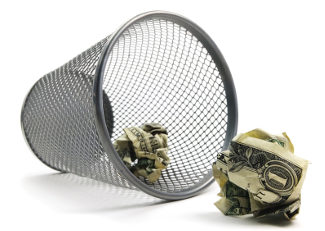The Debt Bubble Keeps Growing: Are You Ready for It to Burst?
Most people realize that the amount of debt in existence worldwide is enormous, but how enormous isn’t immediately obvious. Many people may even labor under the erroneous impression that the debt bubble has improved since the financial crisis, since surely businesses and individuals learned their lesson from that crisis. But the reality is that the debt bubble isn’t just bad, it continues to get worse and worse all the time.
By the end of this year, the total amount of global debt is expected to hit $255 trillion, a $12 trillion increase from last year, and a significant increase from the roughly $200 billion in global debt at the end of 2009. That $255 trillion represents over $33,000 in debt for every single person on the planet. That’s $132,000 in debt for a family of four in the United States, $132,000 for a family of four in Japan, and $132,000 for a family of four in sub-Saharan Africa.
That $255 trillion also equates to over 330% of world GDP, in other words almost three-and-a-half times the world’s total annual economic output. If you think that a debt that large will be paid off anytime soon, or paid off at all, you might want to think again.
World debt levels have become so large, particularly among governments, that no one can realistically expect them to be paid off. It’s only the little people who have mortgages, auto loans, or student loans who get squeezed by lenders and who are expected to pay off their debts. Governments expect to be able to borrow money ad infinitum and keep kicking the can down the road as long as they can. Where will it all end, and what effect will it have on your retirement?
The Disastrous Effects of Debt
The most important thing for retirees to do is to get themselves out of debt before retirement. When the world debt bubble finally collapses, interest rates will spike, which will raise the cost of servicing debt. Those increased costs will trickle down throughout the economy, affecting everyone who holds debt. If you’re still paying off a mortgage, a car loan, or student loans when that occurs, you could see your monthly payments skyrocket.
No one knows where the debt bubble will burst first, only that it will burst at some point. It could come in the form of a sovereign default, such as Greece or Italy no longer being able to service its debt. It could come in the form of a corporate default, such as GM or GE defaulting on its debt payments. Or it could come in the form of a wave of consumer defaults bringing down financial service firms, as we saw happen during the financial crisis.
All we know for certain is that when the debt bubble bursts its effects will be calamitous. Every dollar of debt issued by someone is held by someone else. When interest rates increase and bond prices fall, everyone who holds debt will be affected negatively.
Some of those holding debt are individual investors, particularly those who hold bonds as part of a retirement investment portfolio. The famous 60/40 plan, 60% in stocks, 40% in bonds, is an example of that. When the debt bubble bursts, that 40% held in bonds will lose significant amounts of value.
Many other debt holders include pension funds, which invest with a long-term focus in order to pay out employee pensions. They’ll be similarly affected, which means those expecting pension payments may see their pensions getting squeezed.
Then there are financial institutions that are required to hold certain amounts of high-quality debt. They’re especially susceptible in the case of a sovereign debt default, but in any case their financial position will be negatively affected by the debt bubble bursting too.
How Will You Prepare?
The most important thing to remember about the debt bubble bursting is that it is not a matter of if it will burst, but when. There is a limit to how much debt can be purchased, and when that limit is reached the entire house of cards will come crashing down.
Investors who haven’t prepared for that eventuality will find that their investment portfolios will take major hits once that happens. If your retirement savings contain a large percentage of bond investments, are you prepared to take that hit?
Timing markets is almost impossible to do, which is why it’s important for investors to protect their retirement investment portfolios ahead of a crash. That’s why many investors are already taking steps to protect their portfolios by investing in gold. Gold has a centuries-long track record of protected investors and savers from the ravages of financial turmoil. Investors who held gold during the financial crisis saw their assets spared from destruction, something that gold will excel at doing during the next financial crisis.
Don’t let yourself be like the investors who saw 50% to 80% of their investment portfolios disappear as markets plummeted in 2008. Take the proper precautions today to make sure that your retirement savings remain safe and secure when the debt bubble inevitably bursts.

